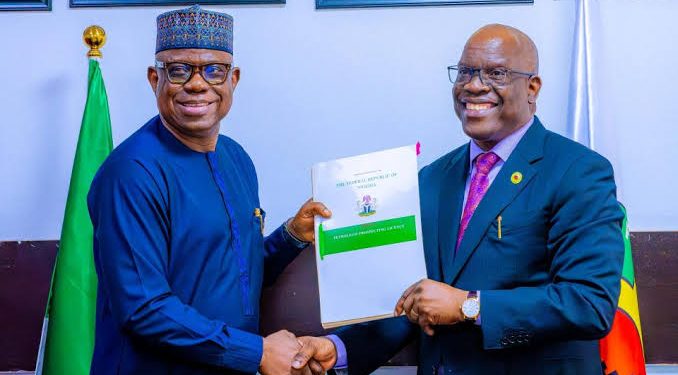The Federal Government has signed a production sharing contract (PSC) with TotalEnergies and South Atlantic Petroleum (Sapetro) for two petroleum prospecting licences covering deepwater blocks in the Niger Delta Basin, in a move officials say will open a new chapter in Nigeria’s upstream oil and gas industry.
The deal, executed through the Nigerian Upstream Petroleum Regulatory Commission (NUPRC) and signed in Abuja on Monday, covers Petroleum Prospecting Licences (PPLs) 2000 and 2001, awarded during the 2024 licensing round. The two blocks span about 2,000 square kilometres. TotalEnergies will operate the assets with an 80 per cent interest, while Sapetro will hold the remaining 20 per cent.
The PSC includes a $10 million signature bonus and production bonuses of two million and four million barrels, or their cash equivalents, upon reaching output levels of 35 million and 100 million barrels respectively. Officials say the fiscal terms reflect international best practice and are designed to attract investment while safeguarding value for the Nigerian federation.
NUPRC Chief Executive, Gbenga Komolafe, described the agreement as the start of a committed work programme that will unlock deepwater potential, expand reserves, and strengthen energy security. He linked the success of the licensing round to reforms introduced under President Bola Tinubu, including 2024 executive orders on fiscal incentives, local content, and contract timelines.
“This PSC provides clarity on cost recovery, profit oil sharing, royalties, host community obligations, and gas utilisation,” Komolafe said. “It lays the foundation for new exploration and investment, positioning Nigeria as the premier destination for upstream investment in Africa.”
The Nigerian National Petroleum Company Limited (NNPC Ltd.), which signed the deal as concessionaire, highlighted its uniqueness. Group Chief Executive Officer, Bayo Ojulari, noted that it is the first deepwater PSC concluded since the passage of the Petroleum Industry Act (PIA), and the first to comprehensively integrate terms for both crude oil and natural gas.
Ojulari explained that the contract sets a cost recovery ceiling of 70 per cent and incentivises performance with milestone bonuses. He said its robust gas terms, particularly around non-associated gas, are critical for Nigeria’s energy transition and for boosting supply in the domestic and export markets.
The Country Chair of TotalEnergies in Nigeria, Matthieu Bouyer, reaffirmed the company’s long-term commitment, stressing its readiness to deliver low-cost, low-emissions projects. He noted that TotalEnergies currently produces over 400,000 barrels of oil equivalent per day in Nigeria and employs more than 1,800 people.
“We are eager to progress swiftly and responsibly with the agreed work programme. Our presence in Nigeria for over 60 years underscores our deep commitment to creating long-term value for the country and its people,” Bouyer said.
The PSC is expected to support Nigeria’s ambition of producing three million barrels of oil per day while catalysing fresh investment into the sector. Stakeholders also highlighted its role in advancing local content, job creation, and environmental responsibility in line with the provisions of the PIA.










